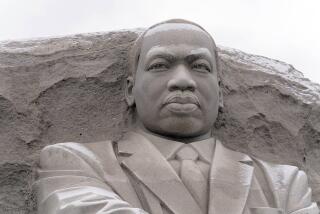Americans: Far More Alike Than Different : Why King was working for all people
On Monday, for the first time, all 50 states will commemorate the anniversary of the birth of Dr. Martin Luther King Jr.
New Hampshire last week became the final state to authorize a paid holiday honoring the assassinated civil rights leader. Gov. Steve Merrill signed an executive order that Martin Luther King Civil Rights Day be celebrated the third Monday of January, as in the other 49 states. (King was born Jan. 15, 1929.)
Last November, after a long controversy, Arizona voters approved a King state holiday. That vote ended a nationwide dispute featuring an economic boycott that cost the state an estimated $300 million in tourism, including the loss of the 1993 Super Bowl to Southern California.
Now, on Monday, Dr. King will be honored throughout a country that seems to be striving once again to overcome racial, economic and gender barriers. The holiday this year occurs the same week as the inauguration of a President who chooses, as did Dr. King, to focus on the similarities rather than the differences among Americans.
President-elect Bill Clinton, a son of the South, came of age in Arkansas as the civil rights movement forged great social change there and across the nation. Like most other white Southerners, he grew up personally familiar with black Americans. That familiarity runs deep. It is evident, for example, in his choice of Maya Angelou as his inaugural poet.
Angelou provides a link between King and Clinton. She served the civil rights leader shortly before he died when she accepted a job as his northern coordinator for the Southern Christian Leadership Conference. She will serve Clinton when she reads her inaugural poem.
The poet, a professor of American studies at Wake Forest University in North Carolina, is featured today in the Los Angeles Times Interview, in Opinion. In an additional comment, she told The Times when asked about AmericaŌĆÖs commonalities:
ŌĆ£Everybody in the world wants the same thing. Everybody. Everybody in the world--the president of the bank and the drug addict--everybody at some point in his/her most private place wants the same thing. Everybody wants to be needed. Everybody would like a job that he/she can do well and for which there would be respectable compensation. Everybody wants to love somebody. Everybody wants to have the courage to attempt love one more time. If people have children, everybody wants their children to be healthy. Everybody wants safe streets, safe homes, clean homes to live in, good food to eat. Everybody. Everybody wants some place to praise God on Saturday or Sunday, and if theyŌĆÖre not religious, at least some place to go to hear a good lecture. Everybody wants a place to party on Saturday night. ThatŌĆÖs true in Beijing, Hong Kong, Stamps, Ark., Little Rock. ItŌĆÖs true in Edinburgh, Cannes, Johannesburg. Everybody. ThereŌĆÖs no mystery.
ŌĆ£Now, how we go about it--I may want to shout when I praise God and someone else wants to light a candle and bow and say some words in Latin. And someone else would want to say some words in Hebrew. And another person might want to bow in a yoga position and recite some Buddhist mantras. Those are superficial changes.ŌĆØ
The wants may indeed be the same; how we go about achieving them creates the differences, and the difficulty. That challenge, faced 25 years by Martin Luther King Jr., will soon pass to the Clinton Administration.
More to Read
Sign up for Essential California
The most important California stories and recommendations in your inbox every morning.
You may occasionally receive promotional content from the Los Angeles Times.










